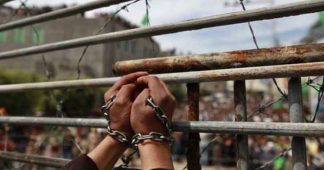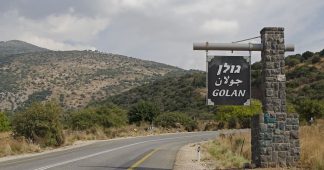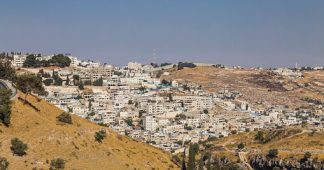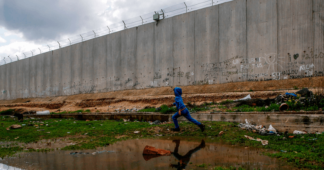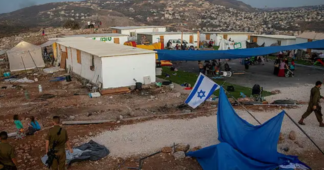Harvard Law School’s International Human Rights Clinic’s recent report declaring that Israel is practicing apartheid is a victory for Palestinian human rights.
In case you missed it, Harvard Law School’s International Human Rights Clinic (IHRC) lately issued a report that finds Israel’s treatment of Palestinians on the West Bank amounts to the crime of apartheid. The study, “Apartheid in the Occupied West Bank: A Legal Analysis of Israel’s Actions” came out on February 28 in the wake of five longer, wider-ranging, apartheid reports published since 2020 – and just before the UN Special Rapporteur on Human Rights in the occupied Palestinian territories published another apartheid report on March 21.
Prepared by the law school’s human rights clinic in partnership with Ramallah-based Addameer Prisoner Support and Human Rights Association, the report was released without fanfare and received minimal press coverage. And it has, so far, drawn no public condemnation by the Israel lobby. The state of Israel reacted only with a perfunctory, non-substantive statement by its UN ambassador, Gilad Erdan, that “those who wrote the report on behalf of Harvard . . . decided to delegitimize the Jewish state because of their antisemitic views.”
Although only 22 pages long, the report includes 130 footnotes that deftly back up the text and let readers drill down further. The narrow focus shines a searching light on the customized legal instruments and processes implemented since 1967 to deprive West Bank Palestinians of their human, civil and political rights.
The precise description of the lawfare by which Israel has, with impunity, intimidated, confused, humiliated, bullied, imprisoned, tortured and killed Palestinians since 1967 generates a compelling cumulative impact. Individual items in the litany are not in themselves news but to see them depicted in their coordinated entirety is to see how the Israeli machine of injustice does its anti-human work.
Given the potency of the report and the prestige of the Harvard brand, there is little doubt that the lobby will eventually go after the IHRC. The Israeli ambassador’s phrasing in his comments hints at the probability that there will be attempts made to pressure Harvard and Harvard Law School to disassociate themselves from “those who wrote on behalf of Harvard,” i.e., the IHRC.
In the meantime, the authors of the report have been circumspect, as has the UN body to which the report was submitted. The United Nations Independent International Commission of Inquiry on the Occupied Territory, including East Jerusalem, and Israel, which was convened by the UN Human Rights Council in May 2021, had called on civil society groups to document possible apartheid violations. (Addameer and the legal aid and research group Al-Haq had sent in another such report in January this year, titled “Entrenching and Maintaining an Apartheid Regime over the Palestinian People as a Whole.”) Link here.
After a meticulous outline of the crime of apartheid in international law, including a clear explanation of how and why ethnic groups, such as the Palestinians (or the Rohinga of Myanmar), are considered “racial groups” under the law, the Harvard-Addameer study maps the “dual legal system that entrenches Jewish Israeli supremacy” on the West Bank.
It begins by quoting what the commander of IDF forces in the West Bank proclaimed to the Palestinians in 1967:
“[A]ll authority of government, legislation, appointment and administration pertaining to the area or its residents will now be exclusively in my hands and will be exercised only by me or by any person appointed therefore by me or acting on my behalf.”
Fifty-five years later, this dictatorial power, which might be understandable in the immediate aftermath of a recent occupation of enemy territory, has been unwaveringly exercised and institutionalized. The power is deployed by way of military orders, more than 1,800 of which have rained down on the Palestinians, but never on the Israeli settlers in illegal Jewish-only settlements that have spread throughout the Occupied Palestinian Territory.
The military orders define “security offenses” ranging from terrorism to traffic offenses. They are prosecuted in military courts, whose workings are ostensibly subject to the Israeli Supreme Court, which over the years, has spoken sternly of the many stringent safeguards that must control the military power. In fact, however, the court defers to the Israeli military’s findings and determinations. Thus, for example, as of 2021, the report says that, out of hundreds of Supreme Court reviews of administrative detention orders, only one has resulted in an order’s revocation.
According to the Harvard-Addameer report, Palestinians can thus find themselves prosecuted for such things as:
“’entering a closed military zone,’ which can be a designation attached on the spot to an area of protest, or ‘membership and activity in an unlawful association’ (note that the Israeli army has assumed power to declare as ‘unlawful association[s]’ groups that advocate for ‘bringing into hatred or contempt, or the exciting of disaffection against’ Israeli occupation authorities).
“Similarly, there are military orders that criminalize gatherings of more than 10 people that ‘could be construed as political,’ if they take place without a permit; publishing material ‘having a political significance’; and displaying ‘flags or political symbols’ without prior military approval. Peaceful expression of opposition to the occupation may run counter to military orders that criminalize anyone who ‘attempts, orally or otherwise, to influence public opinion in the area [the West Bank] in a manner which may harm public peace or public order’; ‘publishes words of praise, sympathy or support for a hostile organization, its actions or objectives’; or commits an ‘act or omission which entails harm, damage, or disturbance to the security of the area or of the Israeli Defense Forces.’”
If this web of orders fails to cover some “act or omission” — or speech or silence — that the Israeli commanders dislike, the terms are easily amended or a new order can be issued. Any Palestinian who wants to argue about his alleged offense is easily shut up – and shut in — using administrative detention, a streamlined incarceration process that the study reports is:
“not subject to a warrant and charges do not need to be disclosed to the detainee. Military Order no. 1651 further grants the Israeli military broad powers to withhold a detainee’s right to communicate with a lawyer and to be brought before a judge in a timely manner. In the course of administrative proceedings to confirm an administrative detention order, military courts may rely exclusively on ‘secret evidence’ that is not made available to the detainee. If the detention order is affirmed, the Order provides that the military commander may extend the detention order every six months, subject to no total time limitation.”
Thousands of Palestinian men, women and children are locked up this way every year. During their imprisonment, they may experience “prevalent practices of torture and ill-treatment, including beating, physical assault, and positional torture,” the study says, drawing on Addameer’s long history of defending prisoners against abuse.
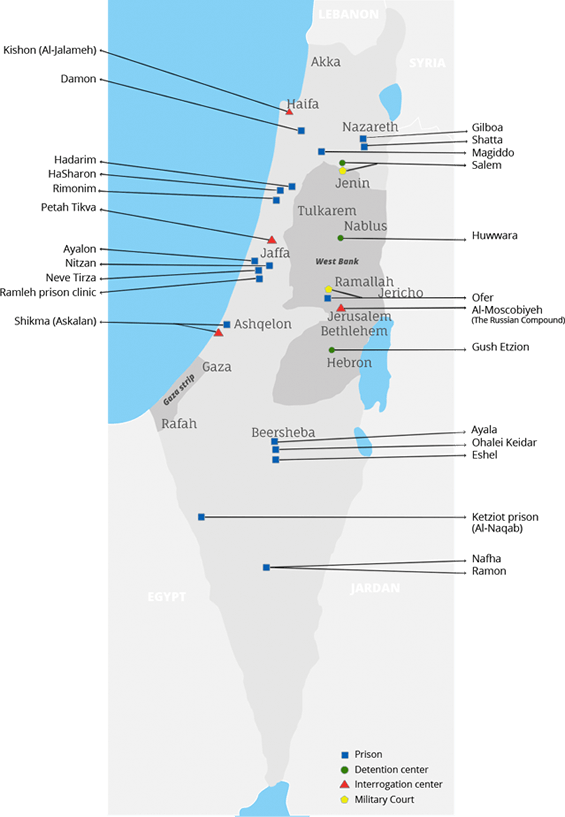
Regarding torture, the Israeli Supreme Court’s decisions are particularly noble-sounding and thoroughly ineffectual in practice. The justices have declared that “torture and ill-treatment of detainees is illegal, emphasizing the absolute prohibition of torture and other cruel, inhuman or degrading treatment or punishment in international law,” the Harvard-Addameer study says. But the court has also “recognized ‘ticking bomb’ scenarios where ‘necessity’ could be a possible criminal defense for using ‘physical interrogation methods.’” The justices have insisted that the “necessity defense” should apply only if the treatment of a person wasn’t so severe as to constitute torture — a determination that would depend on the “concrete circumstances” in each case. The military interrogators thus have the opening they need to always justify “necessity interrogations.”
Recently, the court has clarified that the “ticking bomb” exception doesn’t mean that danger is imminent but merely that there is an immediate need to obtain information. No bomb is needed, in other words. “In practice,” the study says, the court “has created a grave loophole” that enables “the use of torture and ill-treatment against Palestinian detainees with impunity.”
Palestinians also are “deprived of the right to be tried before an independent and impartial tribunal,” the study shows. “The prosecutors, administrative officers, and, most importantly, judges in the military courts are all Israeli military officers,” the authors wrote, noting that the judges’ impartiality is “fundamentally undermined” because they are subject to the “system of discipline and promotion within the military.”
Given the suffocating oppression that this regime imposes on West Bank Palestinians, one can understand why their lot is sometimes said to be worse in certain respects than that of Palestinians living in the Gaza Strip. Moreover, the report notes how “suppression of Palestinian freedom of association and assembly has intensified in recent years, and criminalization of ‘unlawful’ associations has recently been extended to six prominent Palestinian civil society organizations,” including Al-Haq and Addameer itself.
Ironically, the main reason the six groups have been declared unlawful is believed to be retaliation against their assistance to UN and International Criminal Court and other bodies seeking to investigate conditions in Palestine-Israel.
Having described the travesty of apartheid justice, the report concludes:
“These frameworks and institutions, taken together with ongoing long-term Israeli policies of land confiscation and dispossession, restriction of the movement of Palestinians, and expansion of illegal Israeli settlements, systematically serve the purpose of privileging and maintaining the domination of Jewish Israelis over Palestinians.”
Despite its quiet rollout, the study’s high quality and association with Harvard likely mean it will play a significant role in establishing Israel’s apartheid. Michael Lynk, the UN Special Rapporteur, told me that the study is “exceptionally well researched and reasoned” and that he “relied upon it in [his] UN report because it was persuasive and rigorous.” In his report to the UN Human Rights Council in March, Lynk noted the “pitiless features of Israel’s ‘apartness’ rule in the occupied Palestinian territory that were not practiced in southern Africa.” He memorably wrote: “With the eyes of the international community wide open, Israel has imposed upon Palestine an apartheid reality in a post-apartheid world.”
His report encountered no dearth of commentary – “mostly positive and some invective and name-calling, not really adding to the debate,” Lynk says – in other words, the usual, complete absence of substantive criticism of any of the evidence and legal analysis on which the apartheid verdict is based. Lynk declined to speculate on the lack of response to the Harvard-Addameer report.
The Israel lobby’s silence may be explained by the fact that the press has yet to publicize the report, but it seems inconceivable that the lobby will leave unchallenged the idea that Harvard, the sanctum sanctorum of American academia, endorsed such an unsparing condemnation of Israel. The IHRC may be in for some rough weather. At the least, the Clinic’s relationship with Addameer is likely to be attacked.
Addameer itself, of course, is at risk of direct retaliation by Israel, which, as mentioned, already declared it an “unlawful association,” along with the five other distinguished human rights and civil society organizations, in October 2021. Israel has not provided concrete evidence of the “terrorist” links it claims justify the bans. Only alleged “secret evidence” has been invoked, which has led Western countries to hold off imposition of their own related anti-terror sanctions. Moreover, Israel has, to date, largely held off on executing the orders.
This “in terrorem” approach is analogous to the way Israel uses thousands of demolition orders issued against Palestinian structures but held in abeyance, sometimes for years, so as to maintain a continuing threat of sudden demolition. If Israel decides that Addameer, for instance, has gone too far in exposing apartheid crimes, it might – in addition to physically attacking Addameer’s offices and personnel – pressure arrested individuals to give false testimony against Addameer in exchange for a lenient plea bargain. Such evidence might then be presented to other countries to get them to sanction Addameer and its personnel (and, of course, the false charge against Addameer, and such evidence, would be cited by the Israel lobby in attacks on IHRC to get Harvard to condemn the apartheid report).
Nonetheless, the publication of the report is a victory for Palestinian human rights. Moreover, the wariness shown by leaders of the Israel lobby seems to show they are beginning to measure the growing magnitude of the anti-apartheid movement as it continues to build, the potential of the apartheid concept to clarify public perceptions and trigger public outrage, and the risk that flimsy ad hominem attacks on those who carry the apartheid message may only draw more attention to the reports and alienate more uninformed supporters of the Jewish state.
Published at mondoweiss.net
We remind our readers that publication of articles on our site does not mean that we agree with what is written. Our policy is to publish anything which we consider of interest, so as to assist our readers in forming their opinions. Sometimes we even publish articles with which we totally disagree, since we believe it is important for our readers to be informed on as wide a spectrum of views as possible.
